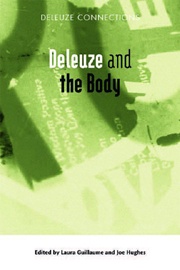Book contents
- Frontmatter
- Contents
- Introduction: Pity the Meat?: Deleuze and the Body
- DELEUZISM
- 1 Time and Autopoiesis: The Organism Has No Future
- 2 Larval Subjects, Autonomous Systems and E. Coli Chemotaxis
- 3 Bodies of Learning
- 4 Believing in the World: Toward an Ethics of Form
- 5 Matter as Simulacrum; Thought as Phantasm; Body as Event
- PRACTICAL DELEUZISM
- Notes on Contributors
- Index
5 - Matter as Simulacrum; Thought as Phantasm; Body as Event
from DELEUZISM
Published online by Cambridge University Press: 12 September 2012
- Frontmatter
- Contents
- Introduction: Pity the Meat?: Deleuze and the Body
- DELEUZISM
- 1 Time and Autopoiesis: The Organism Has No Future
- 2 Larval Subjects, Autonomous Systems and E. Coli Chemotaxis
- 3 Bodies of Learning
- 4 Believing in the World: Toward an Ethics of Form
- 5 Matter as Simulacrum; Thought as Phantasm; Body as Event
- PRACTICAL DELEUZISM
- Notes on Contributors
- Index
Summary
Perhaps Deleuze's first and most fundamental ontological claim is that being is expressive, that it expresses sense. This claim is evident in his early review of Hyppolite's Logic and Existence, where Deleuze maintains the lesson of Hegel's thought to be that ‘Philosophy must be ontology, it cannot be anything else; but there is no ontology of essence, there is only an ontology of sense’ (Deleuze 1997: 191); it is central to his turn to Spinoza, with whom ‘univocal being ceases to be neutralised and becomes expressive’ (Deleuze 1994: 40); and it appears in his turn to Nietzsche, whose eternal return goes beyond abstract expression so that ‘univocal being is not only thought and even affirmed, but effectively realised’ (41–2). Being expresses sense, but it is not necessarily clear what ‘sense’ means. For Deleuze, as for Hegel (Hyppolite 1997: 24), sense is a hybrid concept, the term referring to the physical (the sense of smell), the mental and meaningful (the sense of a statement or thought), and, in the case of the French sens but not its English counterpart, the notion of direction. The word's polysemy leads both thinkers to see a philosophy of sense as being not a philosophy of the superficial – the implication being that beneath the appearance of sense lies some essence – but a philosophy able to theorize these divergent domains as a single assemblage.
- Type
- Chapter
- Information
- Deleuze and the Body , pp. 96 - 114Publisher: Edinburgh University PressPrint publication year: 2011



